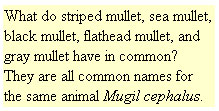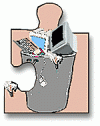show/hide words to know
Choosing Keywords for Internet Searches

Picking the best keyword or list of keywords can make a big difference when searching the Web. As you learn to use better lists of keywords, you will find that the information you are looking for will be easier to locate.
When you type the keywords into a search box, enter only keywords and avoid linking words.
-
For example: if you want to learn about weather patterns in the rainforest, enter only the keywords and skip linking words.

If you want to find information on a subject that uses two or more words (like a title of a book), use quotation marks to link the words. This technique avoids listing pages that use each word separately.
-
For example: if you want to learn about African Violets, use quotation marks-

Increase the number of keywords to locate more specific information. If you end up with no results from the search, reduce the number of words until you locate what you need.
-
For example: if you search on the word fish you will get thousands of suggested links. If you add more words to your search, you will locate more specific information and have fewer links to review.

There are other ways to search using keywords that require advanced techniques.
What's in a Name?
Just what is in a name? For science it is often the difference between the common name - like English Violet - and the scientific name, Viola odorata. Most scientists use the scientific name when writing about a plant or animal. So if you want to learn more about English Violets, you are going to have better luck using the scientific name as a one of your keywords.
What Is a Scientific Name and How Is It Used?
Most scientific names are based in the Latin language and are sometimes called Latin binomials. Each scientific name has two parts, the genus and the specific name. For example, human beings are called Homo sapiens. Why have two names? Having two names helps to better identify a plant or animal. You can think of them as first and last names. If you want to find someone a the phone book that listed only first names you would not be able to narrow your search very much. All the Janes and Georges would be lumped together. The same would be true for only last names. However, if you use both first and last names the list is much shorter.
Why Use Scientific Names?

Scientists agree on names for each plant and animal to make it easier to communicate. Common names can change in different countries, regions and languages. Scientific names are specific for each plant and animal no matter where you are in the world.
Classifying Life: Finding a Scientific Name
You have probably seen taxonomic listings before. They are the ones that look like what you see in the table below. You might think that scientists have these all memorized, but most of them know only a few and consult textbooks for information on others.
| Common Name | Common Buttercup | Domestic Cat | ||||
| Kingdom | Plante (plants) | Animalia (animals) | ||||
| Phylum | Anthopyta | Chodata (chordates) | ||||
| Subphylum | none | Vertebrata (vertebrates) | ||||
| Class | Dicotyledones (dicots) | Mammalia (mammals) | ||||
| Order | Ranunculales | Carnivora (carnivores) | ||||
| Family | Ranunculaceae | Felidae (cats) | ||||
| Genus | Ranunculus | Felis | ||||
| Specific epithet | acris | catus | ||||
|
Genus and Specific epithet = scientific name = species |
||||||
If you ever need to find a complete classification for an animal or plant using the Internet, here are are few tips.
Finding a scientific name - Search using the common name of the plant or animal and the words "scientific name."
- For example: to search for the scientific name for an African leopard you would enter these keywords and press search.

- The results would be some links to web pages that would list the common name and the scientific name - Panthera pardus.
Finding a complete plant or animal classification - Once a scientific name is located you can add different combinations of category keywords to find the complete classification.
- Using the results from our leopard search above, we would enter these keywords and press search.

- The results would be some links to web pages that would list the scientific name and all or part of the classification. Here are the results from one page.
| Kingdom | Animalia |
| Phylum | Chordata |
| Class | Mammalia |
| Order | Carnivora |
| Family | Felidae |
| Subfamily | Panterinae |
| Genus | Panthera |
| Specific epithet | pardus |
| Species | Panthera pardus |
- It might take a few searches and different combinations of keywords to get the entire classification. It is also possible that some plants and animals do not have a subfamily or subphylum.
Spelling Matters

The saying goes "Garbage in, garbage out, or maybe nothing at all." If what you enter is nonsense, what you get out (if anything) will be nonsense as well. Spelling is important when entering your keywords. Some search engines now provide some basic spell-checking tools. However, many scientific names are not going to be checked. Be careful when typing in keywords for your Web search.
View Citation
Be Part of
Ask A Biologist
By volunteering, or simply sending us feedback on the site. Scientists, teachers, writers, illustrators, and translators are all important to the program. If you are interested in helping with the website we have a Volunteers page to get the process started.









